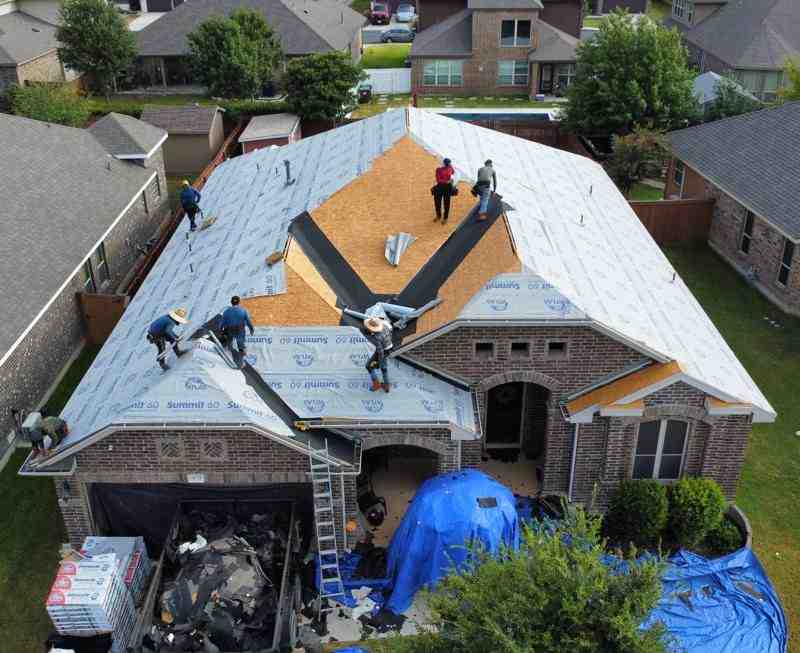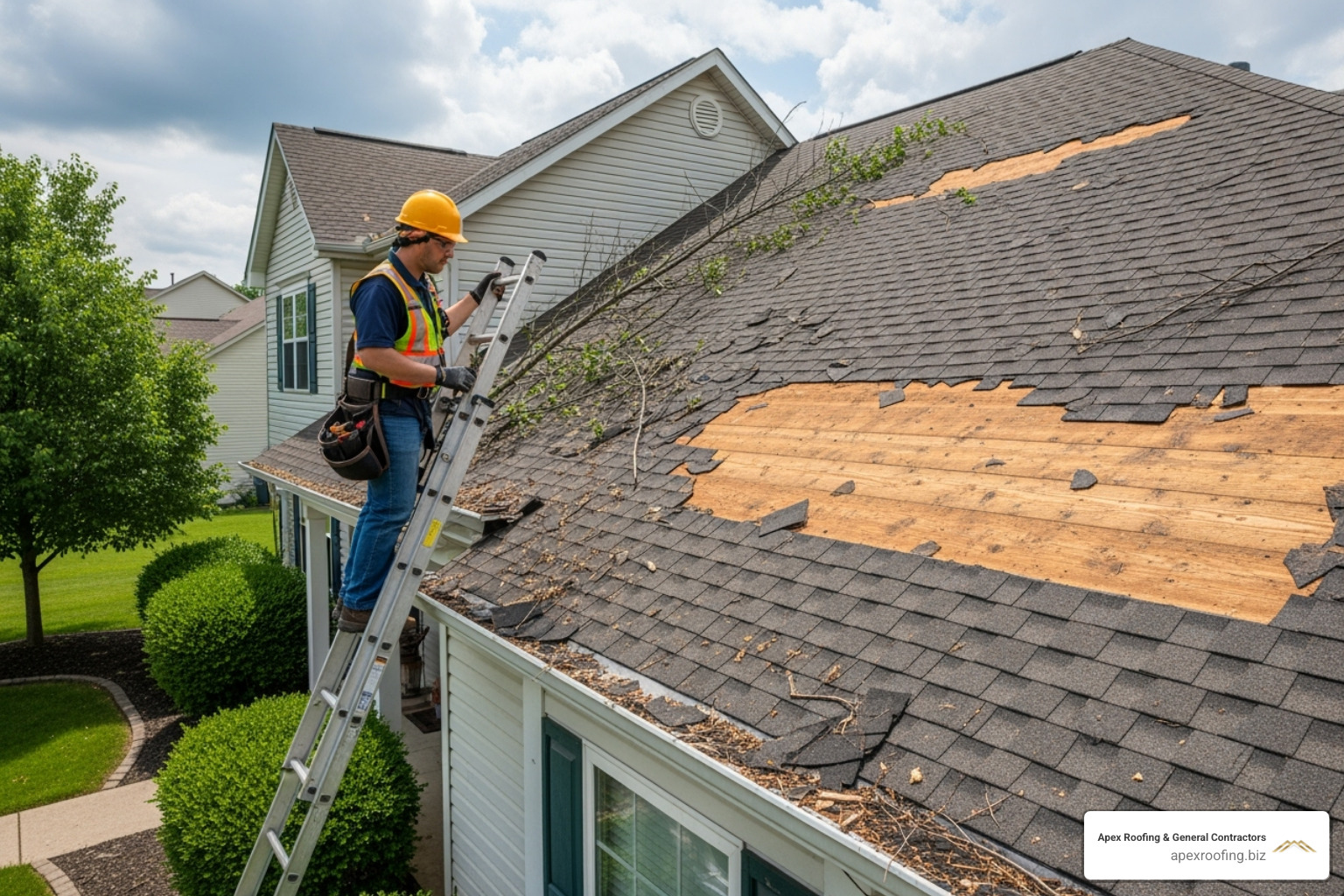Why Specialized Industrial Roofing Contractors Are Essential
Specialized industrial roofing contractors are essential for handling the unique demands of large-scale facilities like warehouses and manufacturing plants. Unlike typical projects, industrial roofing requires expertise in managing vast roof expanses, heavy equipment loads, and complex logistics to ensure minimal disruption. For Texas businesses, finding a commercial roofing company in San Antonio that understands these critical demands is the first step to protecting a major investment. If you are evaluating options, connect with a trusted San Antonio roofing contractor that delivers code-compliant, transparent service.
An expert industrial contractor provides:
- Installation & Replacement: Installing high-performance systems designed for industrial loads and operational needs.
- Maintenance & Repair: Proactive care to prevent costly downtime and protect assets.
- Emergency Response: 24/7 availability for storm damage or sudden leaks.
- Compliance & Safety: Assurance with OSHA, fire codes, and local building regulations.
Industrial facilities face challenges residential properties never encounter, such as chemical fumes and HVAC systems weighing thousands of pounds. As one industry expert notes, “Commercial and industrial roof systems are generally low slope (flat) systems that require extreme care and skill during installation in order to be trouble-free.” A single roof failure can halt production, damage inventory, and put workers at risk.
I’m Carlos Yzaguirre, President of Apex Roofing & General Contractors. Since 2022, my team has helped businesses from San Antonio to Austin and Dallas secure reliable industrial roofing solutions. We specialize in delivering projects on time and on budget, with an uncompromised focus on safety and quality.
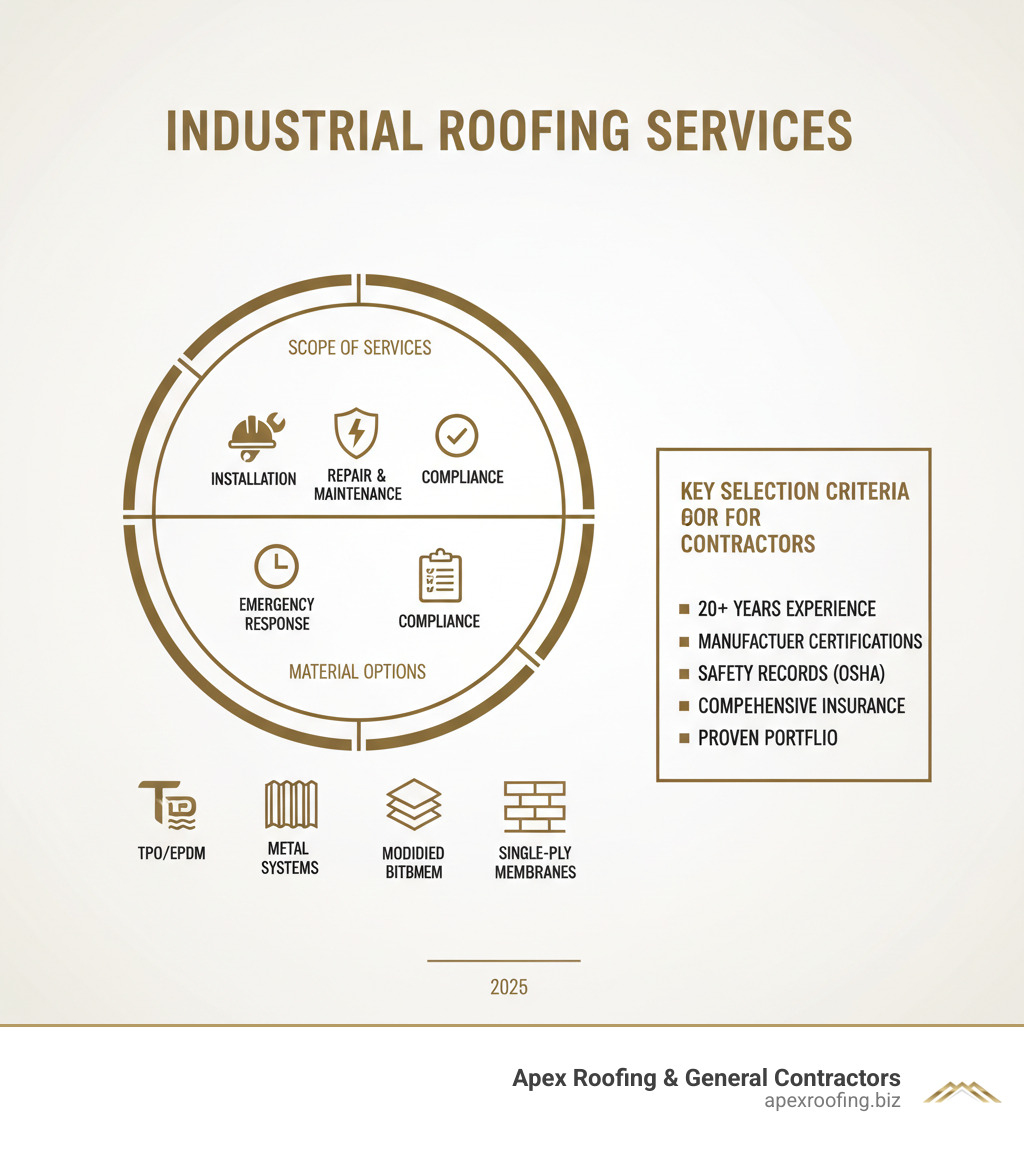
The Unique Demands of Industrial Roofing
Industrial roofs are complex engineering challenges, not typical roofing projects. They demand specialized knowledge and materials from industrial roofing contractors who understand the high stakes involved.
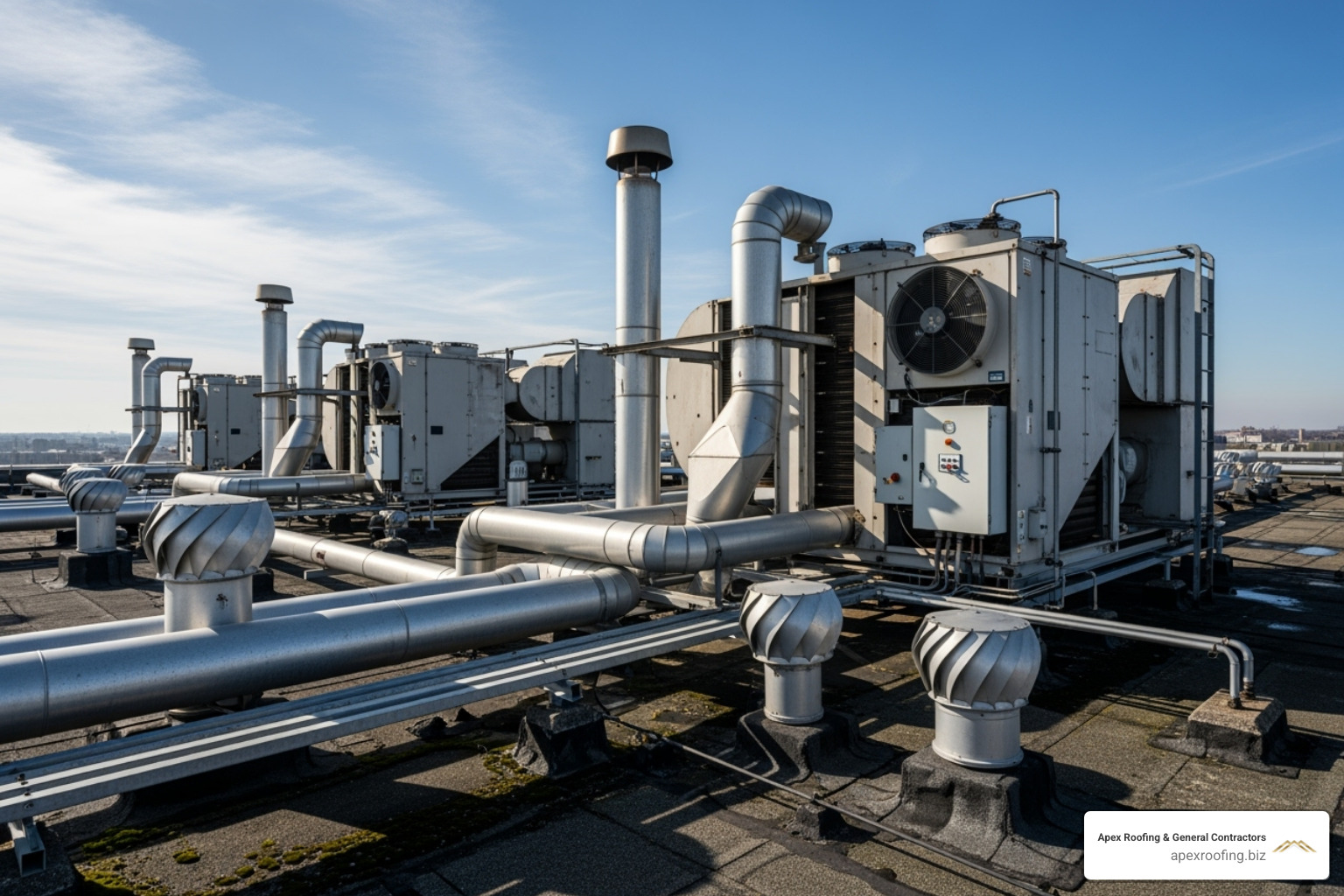
The primary differences start with scale and complexity. Most industrial facilities use low-slope roof systems, where even a slight pitch requires expert drainage design to prevent water from finding weak spots. Key demands include:
- Structural Loads: Roofs must support massive HVAC systems, heavy exhaust equipment, and piping networks weighing thousands of pounds without sagging or failing.
- Operational Continuity: Projects must be planned to minimize disruption to production, often requiring work during off-hours or in carefully phased sections.
- Environmental Exposure: Systems must withstand extreme temperature swings, UV radiation, chemical fumes, and industrial pollutants that would destroy standard materials.
- Safety and Compliance: Contractors must have deep knowledge of strict OSHA regulations, fire codes, and environmental requirements to prevent violations that could shut down an operation.
Challenges for Warehouses and Distribution Centers
Warehouses present a unique set of roofing challenges. Vast, uninterrupted roof expanses are highly susceptible to thermal expansion and contraction, requiring a system that can accommodate movement without tearing or buckling. Puncture resistance is also critical due to heavy foot traffic from maintenance crews servicing rooftop equipment. A single tear can lead to widespread water damage, affecting thousands of square feet of inventory. The areas around docking bays require extra reinforcement to handle constant vibration and prevent water infiltration at roof-to-wall transitions.
Challenges for Manufacturing and Power Plants
Manufacturing and power plants push roofing systems to their limits. Extreme temperature fluctuations are common, with intense process heat creating drastic temperature swings on the roof surface. Materials need exceptional thermal stability to survive without cracking or warping. Chemical exposure from fumes and spills requires specialized, chemical-resistant membranes. Beyond typical HVAC units, these facilities have heavy equipment like cooling towers and process piping that create immense point loads on the roof structure. Finally, due to flammable materials and high-temperature processes, these buildings often require Class A fire-rated roofing systems to comply with stringent building codes and insurance mandates.
Essential Industrial Roofing Systems and Materials
Choosing the right roofing system for an industrial facility directly impacts your bottom line, operational safety, and long-term maintenance costs. The best system depends on your building’s function, local climate, and specific exposures like chemicals or extreme heat. When industrial roofing contractors assess a facility, they match the material to the building’s real-world demands.
| Roofing System | Lifespan (Years) | Durability | Energy Efficiency | Best Use Case |
|---|---|---|---|---|
| TPO | 20-30 | High puncture & tear resistance, flexible | Excellent (cool roof) | Warehouses, distribution centers, facilities seeking energy savings |
| EPDM | 20-30 | Highly durable, UV & weather resistant | Moderate to High | General industrial, harsh climates, long-term performance |
| Metal | 40-70+ | Extreme weather, fire, wind resistant | High (reflective, insulated) | Manufacturing plants, power plants, architectural appeal, longevity |
| Modified Bitumen | 15-25 | Good puncture resistance, robust | Moderate | Industrial facilities with moderate traffic, re-roofing over existing BUR |
Single-Ply Membranes (TPO & EPDM)
Single-ply membranes, a cornerstone of modern industrial roofing since the 1970s, use a single synthetic polymer sheet to create a watertight barrier. This single-ply roofing revolution changed how large-scale facilities are protected.
- TPO (Thermoplastic Polyolefin) membranes offer excellent resistance to punctures, tears, and impacts. Their light color reflects sunlight, cutting cooling costs in warm climates. Modern TPO systems are flexible, lightweight, and can come with 30-year warranties.
- EPDM (Ethylene Propylene Diene Monomer), or “rubber roofing,” provides exceptional durability against extreme temperatures and UV exposure. Its flexibility prevents cracking, and premium systems may offer 30-year warranties covering hail, high winds, and punctures.
Metal Roofing Systems
For maximum longevity, standing seam metal roofing systems are an excellent choice, especially for manufacturing plants and power facilities. With a lifespan of 40 to 70 years or more, metal roofs are a smart long-term investment. Research shows metal roofs have significantly lower life cycle costs and require less maintenance than other systems. Their inherent fire and wind resistance provides critical protection for facilities with demanding operational conditions. Modern metal roofs are also highly reflective and 100% recyclable. For more on the financial benefits, see the life cycle cost benefits of metal roofing.
Built-Up (BUR) and Modified Bitumen Roofing
Traditional asphalt-based systems create tough, resilient barriers ideal for roofs with heavy foot traffic.
- Built-Up (BUR) roofing, or “tar and gravel,” uses multiple layers of bitumen and reinforcing fabrics to create exceptional puncture resistance. Though installation is intensive, a well-built BUR roof can last over 20 years.
- Modified bitumen roofing improves on BUR by adding polymer modifiers for better flexibility. It is lighter than BUR and installs more easily, with modern self-adhering options available that eliminate fire risks during application. It’s a practical choice for re-roofing over existing BUR systems. Learn more about these options in our guide to 3 Types of Commercial Flat Roofs.
Comprehensive Services of Expert Industrial Roofing Contractors
A quality industrial roof requires a partnership that lasts for decades. True industrial roofing contractors offer a complete range of services to protect your investment throughout its lifecycle, acting as an extension of your facility management team.
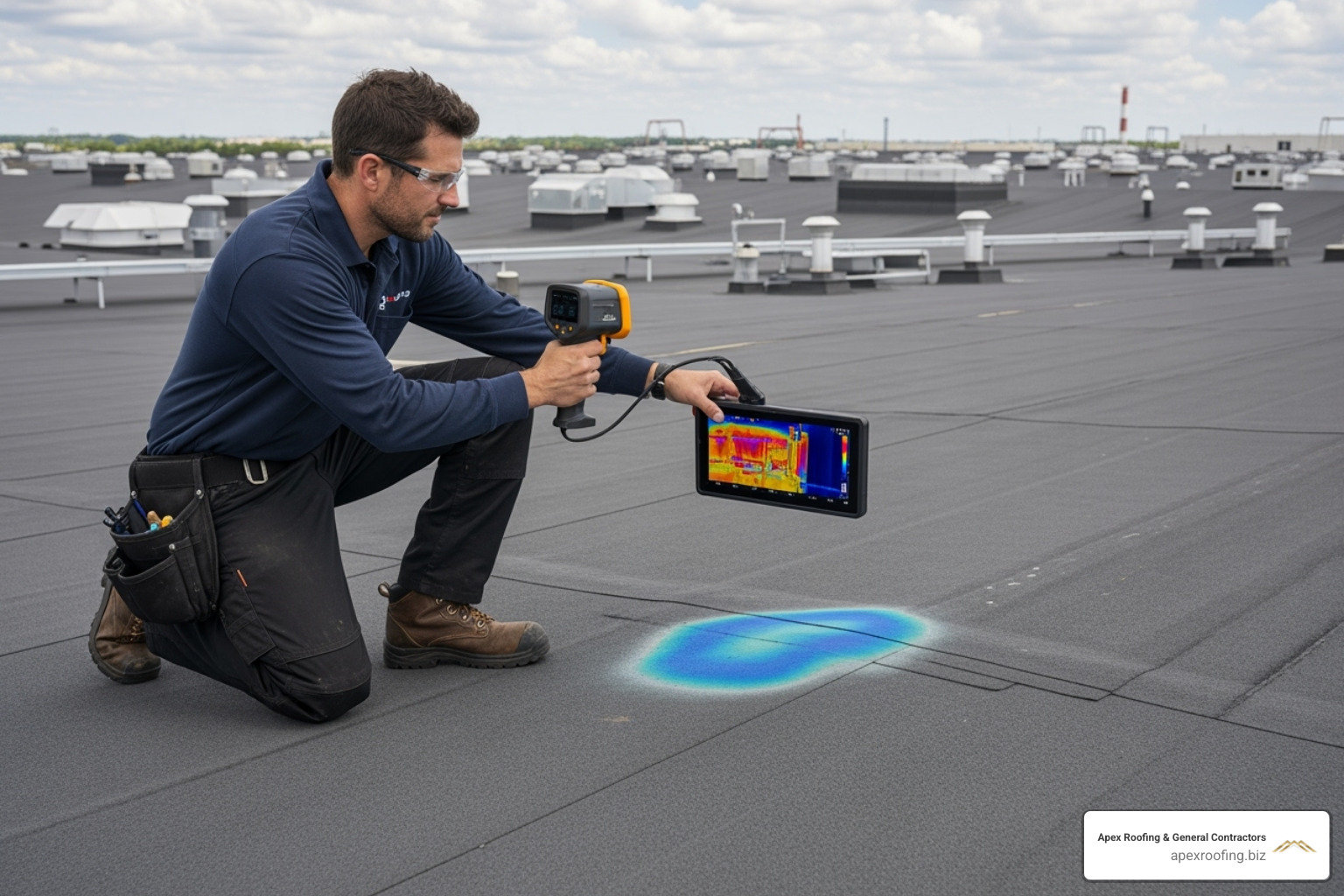
Industrial Roof Installation and Replacement
Installing or replacing an industrial roof is a major infrastructure project requiring precision and strategic planning. Whether it’s a new construction project requiring collaboration with architects or a full roof tear-off and replacement, the goal is to install a system built to last for decades. In some cases, re-roofing over an existing system can save time and money if the current structure is sound. The top priority is always minimizing operational disruption. We achieve this through phased installations and working during off-hours to ensure your production continues uninterrupted. Every project strictly adheres to San Antonio building codes and fire regulations. For more details, see our guide on Commercial Roof Installation in San Antonio.
Proactive Maintenance and Inspection Programs
The most expensive roof repair is the one you could have prevented. Proactive maintenance is the key to extending a roof’s lifespan from 20 years to 35 years. Our programs include:
- Scheduled Inspections: Semi-annual or annual visits to examine every component of your roof system, from the membrane to flashings and fasteners.
- Debris Removal and Drain Cleaning: Preventing clogged drains, a leading cause of ponding water and premature roof failure.
- Thermal Imaging Scans: Using advanced technology to detect trapped moisture invisible to the naked eye, allowing for targeted, cost-effective repairs.
- Detailed Condition Reports: After each inspection, you receive a comprehensive report with findings and prioritized recommendations to help you budget for future needs.
Emergency Repair and Restoration for Industrial Roofs
Roof emergencies demand a rapid response. Our 24/7 emergency crews are ready to mobilize immediately to stabilize the situation and prevent further damage from storms or sudden leaks. Our technicians use advanced diagnostic tools for accurate leak detection and patching on massive industrial roofs. We also specialize in storm damage repair, assessing the full extent of damage and working with your insurance adjuster. For aging but structurally sound roofs, roof coatings and restoration can add 10-15 years of life at a fraction of the replacement cost. Learn how to handle urgent situations in our guide to Navigating Emergency Commercial Roof Repair.
How to Select the Right Industrial Roofing Partner
Choosing the right industrial roofing contractors is a critical decision that protects your entire operation. The right partner delivers a roof that performs for decades, while the wrong one can lead to costly downtime and repairs. Look beyond low bids to find a partner with specialized experience, rigorous safety standards, and transparent business practices.
Verify Experience and Manufacturer Certifications
Relevant experience is paramount. A contractor’s primary focus should be on industrial projects, not residential roofs. Key qualifications include:
- 20+ Years of Industrial Experience: This demonstrates stability and a deep understanding of the field.
- A Strong Portfolio: Ask for case studies of warehouses, manufacturing plants, or other facilities similar to yours.
- Manufacturer Certifications: Certifications from leaders like GAF, Firestone, and Carlisle prove that installers are trained to the highest standards. This is often required to obtain the best warranties, such as 30-year NDL (No Dollar Limit) warranties that cover materials, labor, punctures, and even hail damage. Learn more about Certified Commercial Roofing.
Prioritize Safety, Insurance, and Compliance
On an industrial site, safety is non-negotiable. A contractor’s safety record directly impacts your risk and insurance costs. Verify the following:
- OSHA Compliance and EMR: Ask for their safety record and Experience Modification Rate (EMR). A rating below 1.0 indicates a better-than-average safety performance.
- Documented Safety Protocols: Ensure they have a comprehensive safety program, including regular training and on-site safety officers.
- Insurance and Bonding: Request current certificates of insurance to verify adequate liability and workers’ compensation coverage. The contractor should be fully licensed, insured, and bonded.
- Knowledge of Local Codes: Your contractor must be an expert in San Antonio’s building codes for wind resistance, fire ratings, and structural loads to ensure a smooth, compliant project.
Understand Warranties and the Quoting Process
A warranty is only as good as the company behind it. Differentiate between workmanship warranties (covering installation) and manufacturer warranties (covering materials). The best protection combines both. Always read the fine print to understand what’s covered, such as labor, punctures, or wind damage.
Demand transparent, itemized quotes that break down all costs. Vague estimates often hide future expenses. Finally, prioritize long-term value over initial price. A higher-quality installation may cost more upfront but delivers a lower life cycle cost through greater durability and reduced maintenance.
Key questions to ask a potential contractor:
- Can you provide case studies of similar industrial projects?
- What is your safety record and EMR rating?
- Are you licensed, insured, and bonded in San Antonio, TX?
- Which manufacturer certifications do your installers hold?
- How do you minimize disruption to our operations?
- What are the details of your workmanship and material warranties?
- Can you provide a detailed, itemized quote?
- Do you offer preventative maintenance programs?
At Apex Roofing & General Contractors, we welcome these questions. Call us at (726) 727-7663 for a comprehensive consultation.
Frequently Asked Questions about Industrial Roofing
Facility owners and managers often have pressing questions about their industrial roofs. Here, we address some of the most common inquiries.
How much does an industrial roof cost?
Industrial roofing costs vary significantly, typically ranging from $5 to $15 or more per square foot. The final price depends on the roofing system (TPO, metal, etc.), roof size, structural complexity, insulation needs, and local labor rates. A detailed, itemized quote from a qualified industrial roofing contractor is the only way to get an accurate estimate for your specific project.
How long does an industrial roof last?
The lifespan of an industrial roof depends on the material, installation quality, and maintenance consistency.
- Metal Roofs: 40-70+ years
- TPO and EPDM Systems: 20-30 years
- Built-Up (BUR) and Modified Bitumen: 15-25 years
Regular preventative maintenance is the most effective way to maximize these lifespans.
What are the signs I need a new industrial roof?
Be vigilant for key indicators that signal the need for a professional assessment or full replacement:
- Widespread Water Ponding: Water that remains on the roof for more than 48 hours after rain.
- Frequent Leaks: A pattern of recurring leaks in multiple areas often signals systemic failure.
- Visible Membrane Damage: Large cracks, tears, or widespread blistering on the roof surface.
- Rising Energy Bills: A sudden increase in cooling costs can indicate failing insulation or a compromised roof surface.
- Advanced Age: If your roof is past its expected service life, a proactive inspection is wise.
- Structural Sagging: Any visible sagging or buckling of the roof deck is a serious warning sign.
- Damaged Flashing: Deterioration around vents, skylights, and walls are common entry points for water.
If you observe these signs, contact experienced industrial roofing contractors immediately.
Conclusion
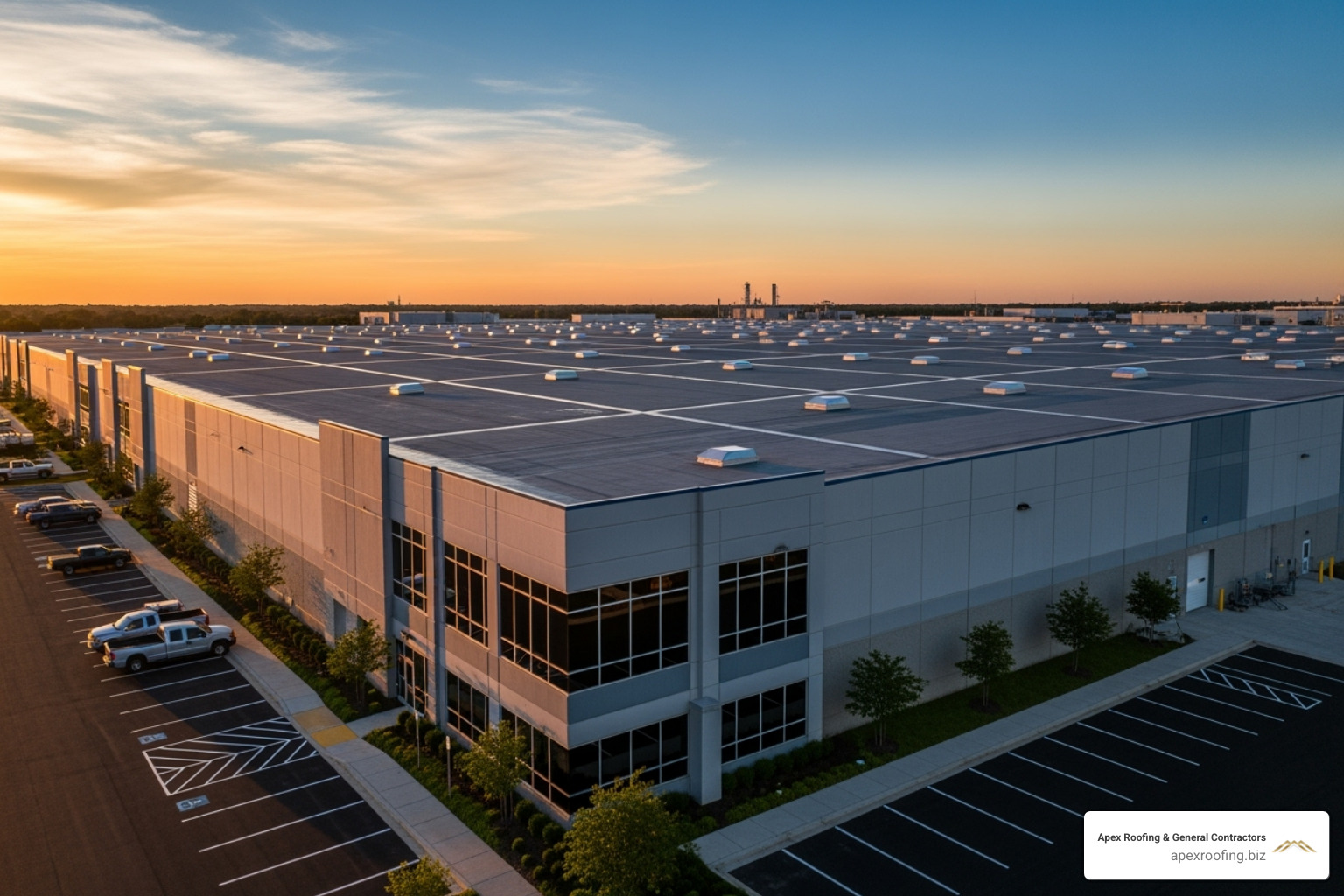
Your industrial roof is a critical asset protecting your people, equipment, and inventory. Choosing the right industrial roofing contractors is not about finding the cheapest bid; it’s about partnering with certified professionals who understand that roof failure leads to costly operational downtime. By prioritizing specialized experience, robust safety protocols, and high-quality materials, you secure peace of mind and protect your bottom line.
The right partner guides you from material selection to proactive maintenance, ensuring your roof performs for decades. Investing in a quality industrial roof pays for itself through lower energy costs, fewer disruptions, and a longer lifespan. This makes it not just the safest choice, but the smartest financial decision.
For facility managers in San Antonio seeking a reliable partner, Apex Roofing & General Contractors offers unparalleled expertise in commercial and industrial roofing solutions. We serve San Antonio, Helotes, Leon Valley, Alamo Heights, Fair Oaks Ranch, Shavano Park, Terrell Hills, and all of Bexar County. Our commitment to certified service and strict code adherence has made us a trusted choice for Texas businesses.
Don’t wait for a small issue to become a crisis. We offer free estimates to help you plan your project. Call us today at (726) 727-7663 for a free inspection and let us protect your most valuable assets.


